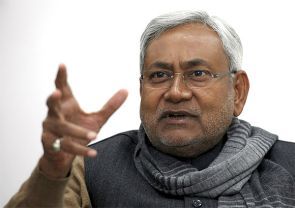 Narendra Modi won't be an issue in Bihar in the next Lok Sabha elections, Chief Minister Nitish Kumar on Wednesday said while refusing to be drawn into a discussion on Gujarat versus Bihar models of development.
Narendra Modi won't be an issue in Bihar in the next Lok Sabha elections, Chief Minister Nitish Kumar on Wednesday said while refusing to be drawn into a discussion on Gujarat versus Bihar models of development.
Kumar, whose party walked out of the National Democratic Alliance in June breaking a 17-year-old alliance with Bharatiya Janata Party, also said the United Progressive Aliance stands to benefit if the Centre grants special state status to Bihar.
He, however, evaded a direct question on whether his party will support a Congress-led government from outside in 2014 saying it was "hypothetical".
"We never discuss persons. But the one whom you are referring to will not be an issue in Bihar. In Bihar, the issues during the elections will be development... You will be relieved when the results are out," he said in reply to a question on Modi factor in the next Lok Sabha polls.
During an hour-long discussion on CNN-IBN, Kumar also said the country can be run only by a person who takes all sections together though "some people keep day dreaming".
Without naming Modi or Gujarat, he also said coastal areas always have the possibility for development and hence it needs to be seen who progressed from where and that Bihar is land-locked unlike those states, which have huge coastal areas that attract industries.
Making a strong pitch for special status to Bihar, he said that this will "determine the future course of politics".
Asked whether he would support a BJP government led by Modi in 2014 if it promised special status to Bihar, Kumar quipped, "The demand is from the present government at Centre. Right now it is the UPA, which is in a position to grant special status."
He also said that the issue can also lead to the coming together of eastern states of West Bengal, Odisha and Bihar but "if those sitting at the Centre take step towards it, they stand to gain from it".
"Our appeal is to the government of the day. If it does not happen, then we will urge people from Bihar to give us enough power to achieve this on our own," he said alluding to the possibilities of new political realignments.
Kumar said the Centre is yet to give any special financial assistance to Bihar, though it is being talked about much and if it really does, "we will reciprocate much more".
Replying to questions, he said it was the ideological commitments due to which his party snapped ties with the BJP "despite running a smooth coalition government in Bihar" and chose a "difficult path" without bothering for consequences.
He also reminded that his party had participated in the NDA government at the Centre only after BJP had agreed to keep out the three contentious issues of Ram temple, uniform civil code and Article 370 out of the agenda.
"We did not compromise on basic issues even for a day...We will not compromise with our political ideology," he said.
Kumar, whose party is in power in Bihar and has marginal presence in some other states, also dismissed a regional party versus national party debate saying in the current political scenario, there is no national party, which has pan-India presence and at best the difference is one-state party and multi-states parties.
He also sought to remind that Biju Janata Dal, which is in power in Odisha and Samajwadi Party, which is in power in Uttar Pradesh, were part of the Janata Dal.
His comments are significant in the backdrop of the fact that whenever a Third Front was formed, Janata Dal was an axis party supported by Left and others in past.
Raising the issue of "fiscal federalism", Kumar said that while political federalism has somehow got strengthened after the Supreme Court intervention bringing to an end the practice of imposing President Rule in states, there is a need to give the states a major say in implementation of economic measures.
He said that states should be encouraged to develop according to their needs, which is not being done right now.
Kumar said that the fluctuation in the national growth will come to an end only when backward states also develop and the country's growth is not dependent on growth of few states.
Image: Reuters










